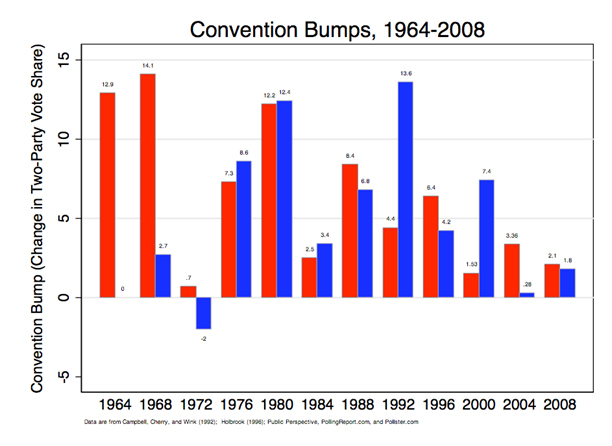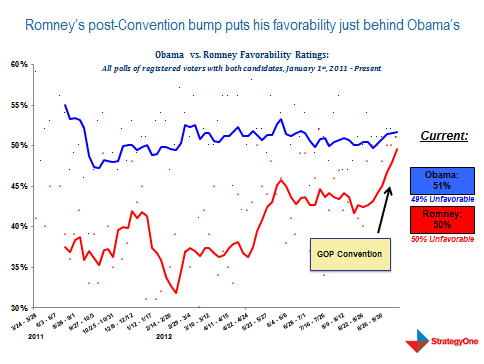
Friends,
The Obama team has a big problem this morning. They are in a box; it's not just that they fumbled this weekend's question over whether people are better off now than they were four years ago, it is that there is no real acceptable answer to the question.
They have an obvious problem if they say "no" -- as Democratic Governor O'Malley did on Sunday -- because it cuts the legs out from under their re-elect rationale. But it is just as problematic to say "yes" because it goes against voter perceptions of reality. At best people think things are the same, which is to say...lousy. That is why the President has been reticent to run around the country telling voters that things are better. That would make him sound disconnected from reality. More problematic is the fact that his campaign has spent millions of dollars -- and the last five months -- trying to kill Romney with messaging about Bain and off-shore accounts rather than laying out the foundation for a "we are better off" strategy. As a result, switching gears will be tricky. For the first time in a month, Romney is truly on the offensive and the polls show Obama's lead has narrowed.
Another problem for the President is that early indications are that last week's GOP convention may have moved the needle on Romney's biggest problem: his favorability rating. A new poll has Romney's favorability up nearly 10 points since the start of the GOP convention (see more on this below). The convention was largely a success (there were some problems, of course, Clint Eastwood and his empty chair being one of them) because it introduced a fuller Romney narrative to the voting public and began the process of humanizing the candidate. Ann Romney's speech helped on both fronts. She's an authentic and persuasive spokesperson for Romney (just as the First Lady was for the President four years ago) and her performance helped some voters see Mitt Romney in a different light (that of husband and father).
And don't dismiss the fact that Romney's convention speech was his introduction to millions of Americans who are just now starting to pay significant attention to the campaign. When your campaign's raison d'etre is your biography -- businessman, turnaround artist, problem solver, savior of the Olympics -- your convention speech is more important than usual. While the Governor's acceptance speech wasn't soaring rhetoric, it was a focused effort at reaching out to key swing voters (suburban women being his primary target).
With that said, here is our take on the current political environment:
- Don't read too much into head to head polling shifts -- in either direction - - over the next two weeks. It's possible that the polls will shift around by a point or two in favor of one candidate or the other for the next few weeks, as is normal during convention season (expect to see quite a bit of "Romney up by one" and "Obama up by two" headlines). By the middle of September we should have a much better idea of where things stand because a) the conventions will be over, b) people will start paying more attention to the race, and c) pollsters will start looking at "likely voters," (some are starting to do this already) which will give a more realistic look at the electorate.
- As we noted above, there has been a slight shift toward Romney (and this began even prior to the convention). We are waiting for the latest onslaught of public polls but our sense is that Romney will get a slight (perhaps 3-4 point) bounce from the convention. It seems unlikely that either candidate will enjoy a truly significant bounce. The number of truly undecided voters is quite small (the latest ABC/Washington Post poll shows 8% of adults and 6% of registered voters as "hard undecided"), so huge swings in favor of either candidate are unlikely. A look back at previous convention bumps shows that the 1992 Democratic convention was the last to produce a significant (i.e. double-digit) surge.

- The one thing that has kept Romney's vote share down is that his personal favorability was so low. The convention may have changed that. New polling data suggests a substantial shift in favorability for Romney; he now has a one to one favorable/unfavorable ratio (the same as the President). A new Reuters/Ipsos (fielded 8/29-9/2) poll shows Romney's favorability spiked to an all-time high of 51% following the GOP convention (his unfavorability is at 49%). This suggests that the GOP accomplished one of its crucial goals last week--closing the empathy gap. Still, likeability hasn't moved the dial as much as was perhaps anticipated; Romney's post-convention bump in the head-to-head was less significant (Gallup's most recent poll, fielded 8/27-9/2, has Obama still up by 1: 47-46).

- This explains why Team Obama refuses to take their foot off of Romney's throat. Their latest TV ad suggests again that he will cut taxes for the rich while hurting the middle class. This has been a consistent strategy for 5 months.
- While somewhat forgotten, the Todd Akin situation hurt the GOP and Romney because it sucked all the oxygen out of the room for an entire week. While it is unlikely to have a significant and lasting effect on the Presidential race, the Akin news came at a time when the Romney-Ryan attacks on Medicare were taking hold. Now, the party's swift and unequivocal denunciation of Akin's comments helped to cauterize the wound (though it will be devastating for the Missouri GOP as Akin will surely lose). Our sense is that this will become an asterisk in the presidential campaign due to the GOP's success in marginalizing Akin as a fringe element.
- Mitt Romney will never win a majority of women but he HAS to close the gender gap between now and election day. Romney cannot lose women by double digits... he has to close the gap to 3-5 points. As we have said before, the gender gap is nothing new and the President has his own problem in this area. But hand-wringing about the GOP's gender gap has been going on for decades. In 2008, Barack Obama won the female vote 56%-43%, and in 2004 John Kerry won women 51%-48%. Romney needs to aim to keep that number closer to the 2004 level.
- This election is not about the economy -- it's about Americans' perceptions of the economy, specifically the perceptions of swing state voters. The Bureau of Labor Statistics may have reported an "encouraging" 8.2% unemployment rate in July, but Americans vote with their hearts. Statistics aren't going to sway them -- it's a matter of which party sells the more compelling narrative on the economy.
- Obama and Romney are neck-and-neck going into the conventions with little expectation of a bump for either party. This will come down to voter mobilization and participation. Obama is concentrating on reviving his support among younger voters by pushing his track record with education and healthcare. He recently rolled out his youth engagement site -- barackobama.com/young-americans -- and will be campaigning at campuses in Iowa, Colorado, and Virginia this week.
- Democrats will have a difficult needle to thread this week (certainly a much tougher job than the GOP's effort to humanize its candidate). The President's record, such as it is, is uninspiring on the issue that matters most (jobs). So Democrats need to a) project optimism about the country's direction while still acknowledging the current economic situation and b) discuss their plans for the next four years in such a way that voters won't ask an obvious question: "If these ideas are so great, why haven't you already tried them?"
Thanks again to Pete Ventimiglia, Kelsey Cohen and Allison Quigley for their thoughts and contributions to this election monitor. Follow us on Twitter: @Steve_Lombardo.
(Please note that the author was an advisor to the Romney for President campaign in 2008, but is not affiliated with any campaign in 2012.)